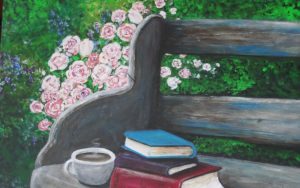
As I write this, World Book Day was just celebrated three days ago. What a great idea!
I love books. I love reading books with facts and I love books with stories. We talk here mostly of stories we as writers create. But do you ever wonder why stories are so important to us?
Right now it looks like we are the only animals who make up stories. Some are entertainment and escape; some try to make sense of the vagaries of chance and the chaos of life with the tales we tell. There is something quite sweetly marvelous about common themes first imagined, spoken, and surviving from centuries ago. We retain a shared humanity, despite the vast differences in technology: unrequited love, jealousy, greed, cowardice, bad judgment, staunch friendships, steadfast love – these have been part of our species all along – and we know this thanks to the tales preserved in books.
It’s a bit chilling to think those stories our ancestors shared long ago would not likely have endured without inventing writing and books.
a string of words
Because what is a story? A string of words. Air comes from the lungs, passes the larynx, vibrates the vocal cords, and takes shape from how the tongue touches the palate, teeth or the lips. The fragile exchange of a moment in a life. I die, you die, that story I told you is gone.
Somehow the notion of the importance of books carved a hold into the psyche of many cultures. Our predecessors experimented with books made of stone, leaves, bark, reeds, silk, animal skin, trees, and now, light: the ebooks of the 21st century.
powerful conduits
It has been books through the centuries which have kept alive the great treasure of humanity: our greatest stories, mythologies, thoughts, inventions, and dreams.
We owe the survival of the greatest thoughts dreamed up by humans to the invention of books. Alas, of course books have also been written to spread messages of bigotry and intolerance, justifications for war, discrimination, exclusion, hatred, exploitation. They are powerful conduits, books.
our notion of civilization
Still, what if, just as we lost the languages and wisdom of so many oral traditions, we had lost the memory of such foundations of our society as human rights, democracy, the right to a fair trial, compulsory education, and social concern for the disadvantaged? Our notion of civilization has been fundamentally formed thanks to books holding those memories for us.
How fortunate are we to be able to benefit from the efforts of scribes, illuminators, translators, booksellers, teachers, scholars, travellers, spies, monks, librarians, smugglers, printers and tireless readers of books – forgotten men and anonymous women – who preserved books for the future, we the unknown generations to come.
May we do them proud with the stories we will now create.